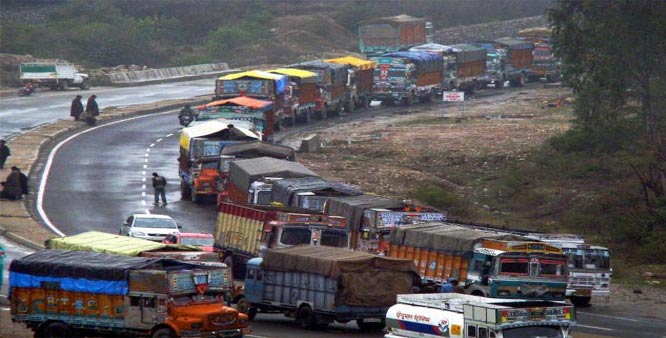New Delhi, Nov 14: Stating that around four lakh trucks are stranded in various parts of the country, the apex transporters body AIMTC today demanded immediate increasing of cash withdrawal limit from ATMs and banks to avoid crisis.
 All India Motor Transport Congress (AIMTC), claiming to have 93 lakh truckers, 50 lakh buses and tourist taxi and cab operators under its fold, said at least eight lakh drivers and conductors were severely impacted in the wake of de-legalizing of Rs 500 and Rs 1,000 currency notes.
All India Motor Transport Congress (AIMTC), claiming to have 93 lakh truckers, 50 lakh buses and tourist taxi and cab operators under its fold, said at least eight lakh drivers and conductors were severely impacted in the wake of de-legalizing of Rs 500 and Rs 1,000 currency notes.
"Our about 4 lakh trucks are stranded across India with about 8 lakh drivers and conductors severely hit. The sudden ban on higher denomination notes have made them stand in long queques before banks in different parts. The withdrawal limit is minuscule with ATMs at many places not working and paralysing the transport business," AIMTC president Bhim Wadhwa told PTI.
Demanding immediate increasing of withdrawal limits, Wadhwa warned that essential supplies like milk, vegetables, fruits and medicines would be impacted.
The drivers and tourists who are en route do not have ample cash in hand and are starving on the highways with no help coming from any quarter, he said.
"The road transport fraternity of India is facing its worst crisis with the banning of higher denomination notes," he said, adding, this despite transport being the highest taxpayer to the exchequer.
AIMTC said that in the last fiscal, contribution of the Road transport to GDP was 4.8 per cent, which amounted to Rs 5,44,800 crore annually or Rs 1,492 crore per day.
"Eighty per cent of the transport operations cost is cash based. This implies Rs 1,194 crore is required on a daily basis by the transport sector for its operations. As per the finance Act section - 6D(d) of IT Act, Rs 35,000 per truck per trip cash is allowed for en route expenses. A small operator having 10 trucks would require up to Rs 3,50,000 cash per day to tide over his requirement, which is unsustainable under the present cap," it said.
With acute liquidity and financial crunch, the transportation services are poised to come to a standstill, Wadhwa said.
He also said export-imports of the country was likely to be hit due to disruption in movement of vehicles to and from the ports. Besides, transporting raw materials to the industries and finished goods to the distribution centres would also get affected.





Comments
we offer full support to sarva shakthimaan shri shri narendra modi ... awesome googly , in one shot islamic hawala network shattered and protests which was happening in kashmir melted down ... all patriotic indians say , bholo bharath mata ki jai ... hara hara modi ... yesterday one of the most respected minority community in india ,did langar in railway station ... their love for nation really has to be appreciated ... mainly in congress run states and non bjp run states this is causing problem as they are encouraging chaos .kolkata , hyd , up , delhi , karnataka , kerala and tamilnadu ... why no news in rajasthan, chattisgarh, ap , goa, mp , uttarkhand , maharashtra ?
Coming days and weeks are very scary. Anything might happen.
He is eligible for Parliament's canteen as Chai Maker. Not for PM's post. Narender Dramdodardas modi.
Feku Maharaj.... come out of your sleep
Add new comment